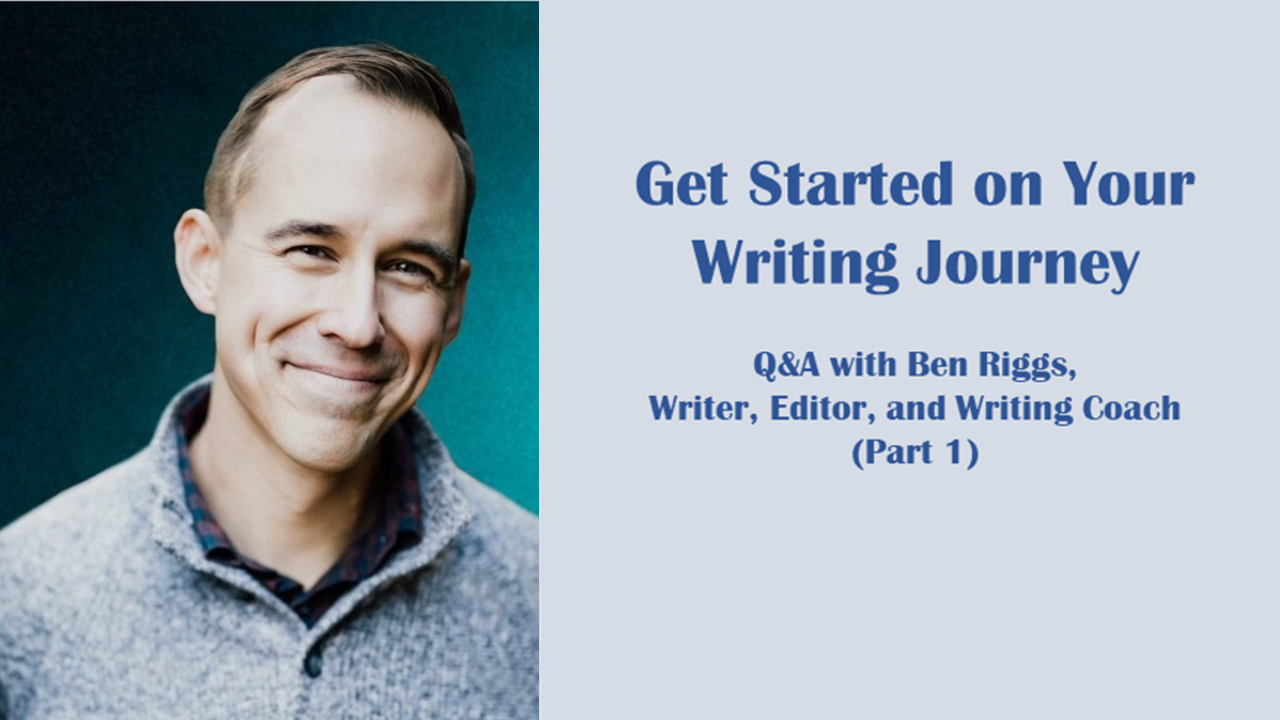Many dream of becoming a published author and turning writing into a full-time job. Others simply strive to capture their thoughts, experiences, and stories in writing to share with a few friends and family members.
Whether you’re hoping to become the next Stephen King or you want to start or grow your online blog, learning from experienced writers about the writing and editing process will help get you started.
We sat down (virtually) with writer, editor, and writing coach Ben Riggs to learn more about how he approaches the writing process and what he recommends for someone interested in starting on their own writing journey, either as a hobby or career.
How did you begin your journey as a writer? How did you discover your passion for writing?
I asked for a typewriter for Christmas when I was about nine years old. My mom owned one, which had belonged to her dad. There was something romantic and whimsical about sitting down to that cold metal machine and watching it come alive with clicks and clacks.
The one she bought me—a blue and yellow plastic one from those now nostalgic JCPenney Christmas catalogs—became ground zero for me in many ways. I used it to write about everyday goings-on and weekend events: the mission to rescue our blind cat from behind the couch; the case of the missing LEGO set; etc.
My passion was cultivated by teachers over the years, particularly my English teachers. I didn’t recognize their investments in me at the time, unfortunately. Even though I couldn’t say then that I “loved” writing, I’m thankful they took the long view. And their investments have since led to dividends and returns in me I’ll never be able to give back to them.
Every writer has a unique approach to writing. Describe your writing process.
Nearly every writer ought to follow some version of the following writing process: “Idea, collect, focus, draft, and rewrite.” Not every portion of that process is as realized as the others, but I do try to make sure I’ve visited each one along the way. At the end of the day, though, I zoom out and see the particulars of the writing process existing between two questions: “What do I want to say?” and “Have I said it?”
For me, drafting is the process of thinking to write and writing to think. It’s sometimes helpful to even divide drafting into prewriting and drafting. Prewriting can take many forms—freewriting, taking notes on your notes, writing fake leads (what I call “burner leads”), etc.—but the idea is to create some psychologically safe space where you’re learning what you know, what you don’t know, how you feel about it, and what it means.
I try not to think too much about the anticipated reader. Instead, I think of myself as the first reader. I can’t think of another reader this early on. Others can, and they’re enigmas to me. If I think about the anticipated reader too soon, I fall into what William Zinsser called “the tyranny of the final product.” And nothing slams on the brakes like trying to write something better than a piece of writing that doesn’t exist.
When I feel confident that what I want to say is contained somewhere in the cacophony of clauses, I start asking “Have I said what I wanted to say?” This is when I think about the reader and the reader alone. I try to be as specific about who the anticipated reader is. The “general reader” we learned to write for in school doesn’t exist (and we wrote for our teachers anyway). So, envisioning a specific reader helps me focus my rewriting and editing decisions.
Why do so many people struggle to get started with writing?
For those who aspire to do more writing, whether for personal or professional reasons, getting started feels like trying to cross this expansive chasm between “wanting to write” and “having written.” They metaphorically see the other side, where everyone is enjoying having written, but they forget that anyone who’s ever crossed that chasm has done so the same way: word by word. I realize that sounds simplistic, but I can’t count the number of times I’ve talked with writers who have amazing ideas and incredible things to say, but they were fixated on arriving to the land of “having written” to the point where they forgot there’s only one way across the chasm: words on the page.
In your experience, what is one obstacle to writing well?
Believing that readers want to be wowed by expertise rather than needing to connect to and care about something that’s stated clearly.
Is writing well subjective?
Brooks Landon, author of Building Great Sentences, wrote that effective writers anticipate and satisfy readers’ needs. I like that because it offers an objective basis to what we might call “writing well.” It means your writing is indelibly shaped to meet a reader’s first needs for accuracy and clarity. A writer who hasn’t fought to be accurate and clear doesn’t stand a chance to connect to a reader. Once you connect to a reader, then you can inform, entertain, etc. Beyond that, the subjectivity is in how readers’ needs change based on what they’re showing up for; someone reading a movie review in The New Yorker has different needs than a new mom reading What to Expect When You’re Expecting. Even so, both of those readers need to connect to writing that they trust is accurate and clear. If they have to work too hard to move from sentence to sentence or to understand what’s been said, it’ll go to the wayside.
In your article, “Six Ways to Improve Your Writing,” you stated that there is a “myth that says the world is full of ‘gifted’ writers, who effortlessly spin readable, error-free prose […]” Can you explain what you meant by that?
Much of this gets at the role that mindset has in our writing: what someone expects of themselves as a writer and from the writing process anticipates a lot of the way they’ll try—or avoid—writing.
The language came from a conversation I had with a group of high-schoolers I coached. Some didn’t think it was worth their time to learn how to write better because they weren’t “gifted” like others in their grade level. When I pressed further, I learned they felt some students could churn out exceptional writing the way a light bulb emanates light at the flick of a switch. Great writing, just like that. For these supposed “gifted” writers, their first draft and final draft were the same thing. No rewriting required. This meant these other writers, whom I quietly called “struggling writers,” were destined to always struggle and never arrive. Their life forever contained Roman numerals alongside clunky outlines and drafts that never had that perfect sentence right away. For them, rewriting was punishment for not writing well the first time.
Now, that doesn’t mean their peers weren’t great writers. Some were and are great writers. And it’s fair to say that they may have better intuition for mood, rhythm, etc. But it’s not true that they were born with a perfect draft in their hands. A key variable for these “gifted” writers is they were probably read to as kids and continued reading themselves (that’s a bigger conversation for another time). But they, too, are struggling writers. As we all are.
This invisible cleft between “gifted” and “struggling” writers made sense of some of my own anxieties when I began writing as well as the anxieties of others whom I had coached or taught.
Since then, I’ve often said that I don’t believe in gifted writers. Instead, I believe in struggling writers who don’t neglect the gift of writing.
Do you have pieces of writing advice you make a point to mention to most people?
- Embrace the mess of drafting.
William Stafford said to “lower your standards.” Remind yourself your first draft will not be your final draft. Your final draft will be better than this, but you won’t find your final draft until you’ve written a first draft. See your drafting as an invitation to get productively lost in language. Avoid forcing an ocean of words into a thimble of editorial expectations. As Donald Murray said, “Yes, your draft will need editing, but first it needs writing.” - Give yourself grace as your edit.
As you edit, you’ll find gaps in your writing. It won’t be as tight or focused as you’d hoped. You’ll find paragraphs where you cleared your throat and found your confidence. Unclear sentences will emerge, and almost-right words will no longer be helpful. You’ll discover empty linking verbs and gray abstract nouns and long warm-up phrases that start with “while” and “although.” Avoid the depression that wants to follow these discoveries and encounters with your humanity. Remember that readers want writing that came from a human. Yes, make cuts with robotic pragmatism, but don’t be embarrassed when you shed a tear for a “murdered darling.” - Publish when the piece is ready, not when it’s perfect.
Revising is about interrogating your choices and finding alternatives, which can be infinite. Enjoy the adventure of testing every word and phrase and sentence. But remember that the task of editing isn’t to create a perfect piece of writing, but the right piece of writing.
How do you help individuals who want to improve their writing and take it to the next level?
I love meeting writers where they are, which often means I’m talking with them more about how to think differently about themselves as writers than about how to write differently, though the latter obviously happens.
I’ll talk about finding a focus and commas any day, but once writers learn to have more confidence in themselves, they become more willing to embrace the hazards of the writing process. And once that happens, you’re off to the race.
I've found that most clients, even self-described "non-writers," know more about what makes for great writing than they think they do. They just need a better starting point for thinking about writing—and to know they belong at the table.
What tools and resources do you recommend to help writers improve their writing?
Read books by journalists and their editors. These are the folks who’ve learned what it takes to meet deadlines while maintaining accuracy and clarity in piece after piece.
One good place to start is anything written by Roy Peter Clark. Another terrific resource is the book Telling True Stories, which is a compilation of contributions from numerous writers and editors of nonfiction narrative. Writers of any industry and stripe should learn from veteran writers in the field of nonfiction narrative. More than anyone else, they’ve had to learn how to distill the grandiosity and complexity of real life into words that connect to readers to inform, entertain, and advocate.
For what it’s worth, I published a booklet about this entitled Tell Them a Story: Using the Best Lessons from Narrative Nonfiction in Your Everyday Writing, published by the Editorial Freelancers Association.
As for writing tools that help relieve some of the pressure, I encourage folks to look into installing the editing software WordRake or PerfectIt. I have WordRake and I run it through everything I write. It inevitably catches lots of great opportunities to sharpen and clarify a piece of writing.
About Ben Riggs
Ben is a writer, editor, and writing coach in Dayton, Ohio. He's married to his wife, Emily, and is an unabashed dog dad to Lewie. He's the author of Tell Them a Story. And he posts regularly on his LinkedIn page.
About the Author
Nicole Abboud-Shayan is the Business Development Associate for WordRake. Prior to joining the team, Nicole practiced law for several years and then launched her own media and marketing company. Follow Nicole on Twitter @nicoleabboud or connect with her on LinkedIn.






